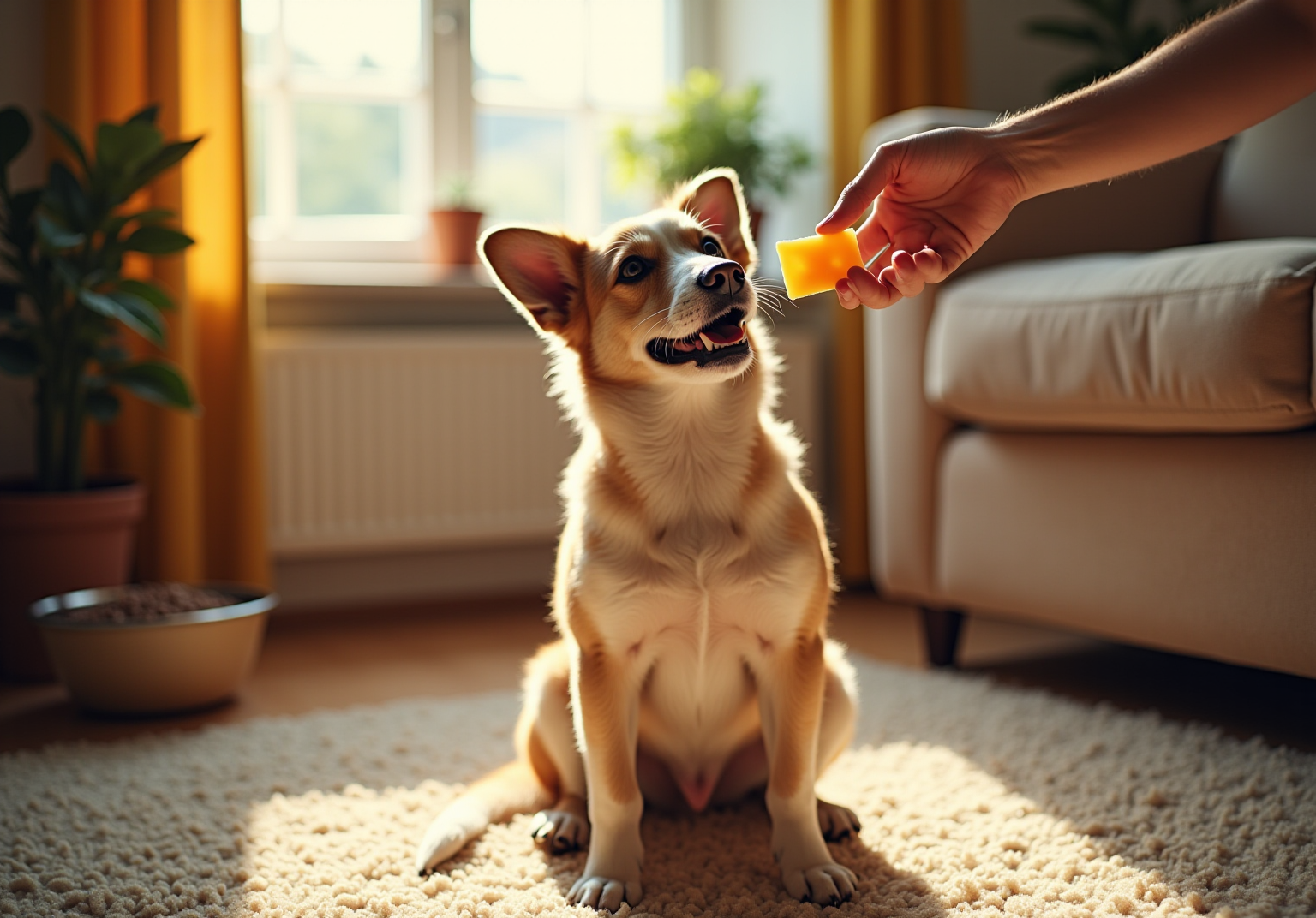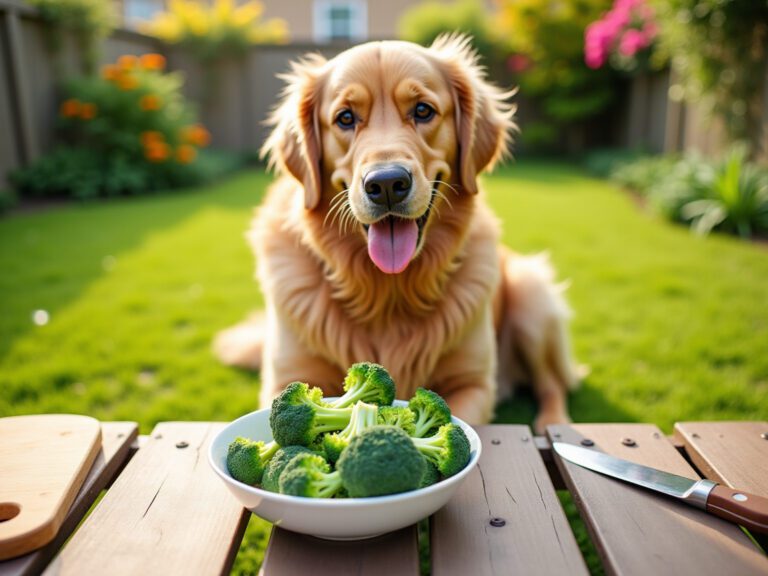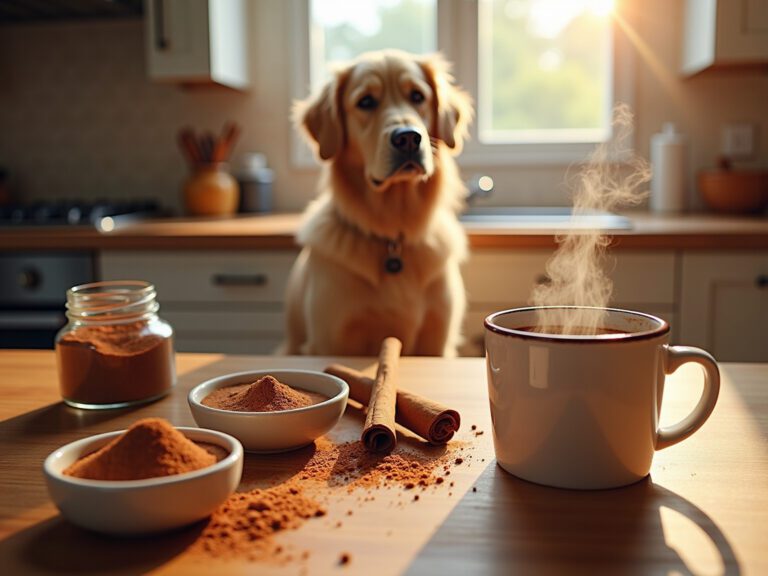Is Cheese Bad for Dogs? Understanding Risks and Benefits
Overview
As a loving pet owner, you may wonder about the role of cheese in your dog’s diet. Cheese can indeed be both beneficial and risky, depending on your furry family member’s individual health conditions and the specific type of cheese consumed. While cheese offers nutritional benefits, such as protein and calcium, many dogs may struggle with lactose intolerance. This can lead to digestive issues, which is why moderation and careful selection of low-lactose options are essential.
At Adventure Den, we understand your concerns about providing the best for your pets. By choosing the right type of cheese and monitoring your dog’s reaction, you can enjoy the benefits without the risks. Remember, your dog’s health is our priority, and we are here to help you navigate these choices.
Incorporating cheese into your dog’s diet can be a delightful treat, but it’s important to do so thoughtfully. Always consult with your veterinarian to ensure that your dog’s dietary needs are met. Together, we can create a nurturing environment where your beloved pets thrive.
Introduction
Cheese often delights the taste buds of our furry family members, making it a beloved treat among pet owners. Yet, the question of whether cheese is bad for dogs reveals a complex interplay of health considerations and nutritional benefits. While some dogs can enjoy cheese in moderation, it’s essential to consider the risks associated with:
- Lactose intolerance
- Sodium content
- Potential digestive issues
Can cheese truly be a safe indulgence for our pets, or does it carry hidden dangers that every caring pet owner should be aware of?
Assess Cheese Safety for Dogs: An Overview
Cheese is a beloved treat for many dogs, known for its delightful taste and enticing aroma. However, the question of whether cheese is bad for dogs can be a bit complex. While many dogs can enjoy dairy in moderation, it’s crucial to consider their individual health conditions and nutritional requirements. Factors such as the type of dairy product, your dog’s size, and any existing health issues play a significant role in determining if cheese is bad for dogs.
For instance, up to 90% of adult dogs may not have the enzymes needed to digest lactose, which raises the concern of whether cheese is bad for dogs, as it can lead to digestive discomfort if they indulge too much. Some cheeses, particularly blue varieties, contain roquefortine, which leads to concerns about whether cheese is bad for dogs and should be strictly avoided. Veterinarians recommend opting for low-fat and low-sodium options like mozzarella and cottage cheese, while also addressing the question of whether cheese is bad for dogs to minimize health risks. Remember, dairy should only constitute a small portion of your dog’s diet—ideally no more than 10% of their daily caloric intake. It’s essential to recognize that dairy products should not serve as a primary source of nutrition for dogs.
Signs of lactose intolerance in dogs can include:
- Vomiting
- Diarrhea
- Bloating
- Gas
This raises the question of whether cheese is bad for dogs. By being aware of these factors, including the possibility of allergic reactions, you can make informed choices about whether cheese is bad for dogs when introducing dairy into your pet’s diet. This way, cheese can remain a delightful treat rather than becoming a dietary staple, ensuring that your beloved pet enjoys every moment of their mealtime.
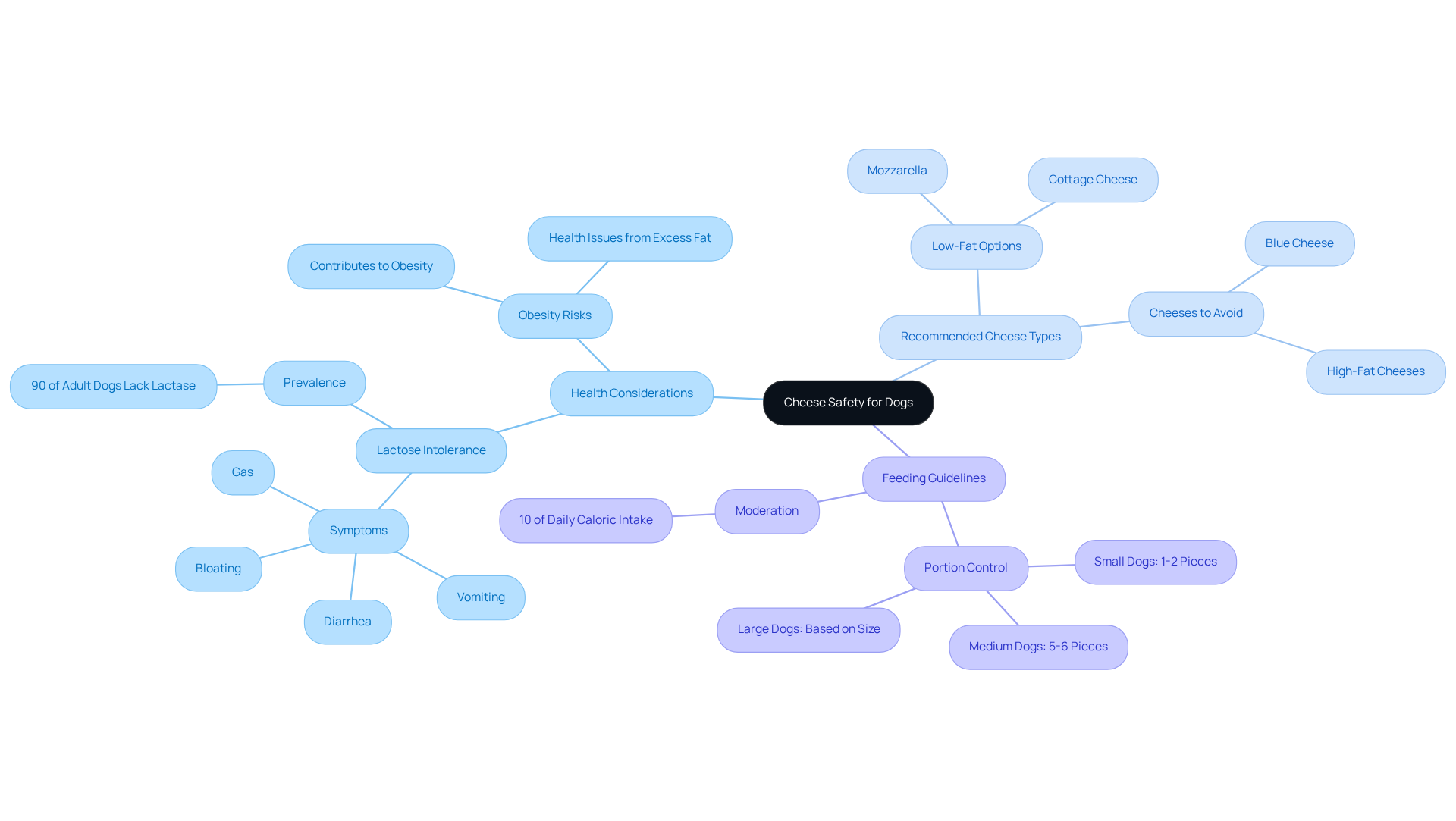
Identify Health Risks: Lactose Intolerance and Other Concerns
When considering the health of your furry family members, a major concern related to is cheese bad for dogs is the potential intolerance to milk sugar. Many dogs, especially as they age, may lose the ability to effectively break down the sugar found in milk and dairy products. If your beloved pet shows signs of milk sugar intolerance, such as diarrhea, vomiting, or abdominal discomfort, these symptoms can arise within just 12 hours of consumption.
It’s important to remember that numerous dogs are lactose intolerant, which leads to the question: is cheese bad for dogs? Therefore, pet guardians should approach the incorporation of dairy into their diets with caution, especially regarding whether is cheese bad for dogs. Additionally, some cheeses can be high in sodium and fat, which raises the question of whether cheese is bad for dogs, particularly for pets with existing health conditions like pancreatitis or heart disease. For example, indulging your dog with high-fat treats like whipped cream can trigger pancreatitis, a serious condition that requires immediate veterinary attention.
Understanding these potential health issues is essential for ensuring the happiness and well-being of your dogs. Regularly monitoring your pet for signs of lactose intolerance—such as gas, bloating, and changes in appetite—can help you stay ahead of any problems. Consulting with a veterinarian before introducing any new food into your dog’s diet is a wise step to mitigate risks and ensure a safe, enjoyable experience for your furry friend. Your pet deserves the best care, and being informed is the first step in providing that nurturing environment.
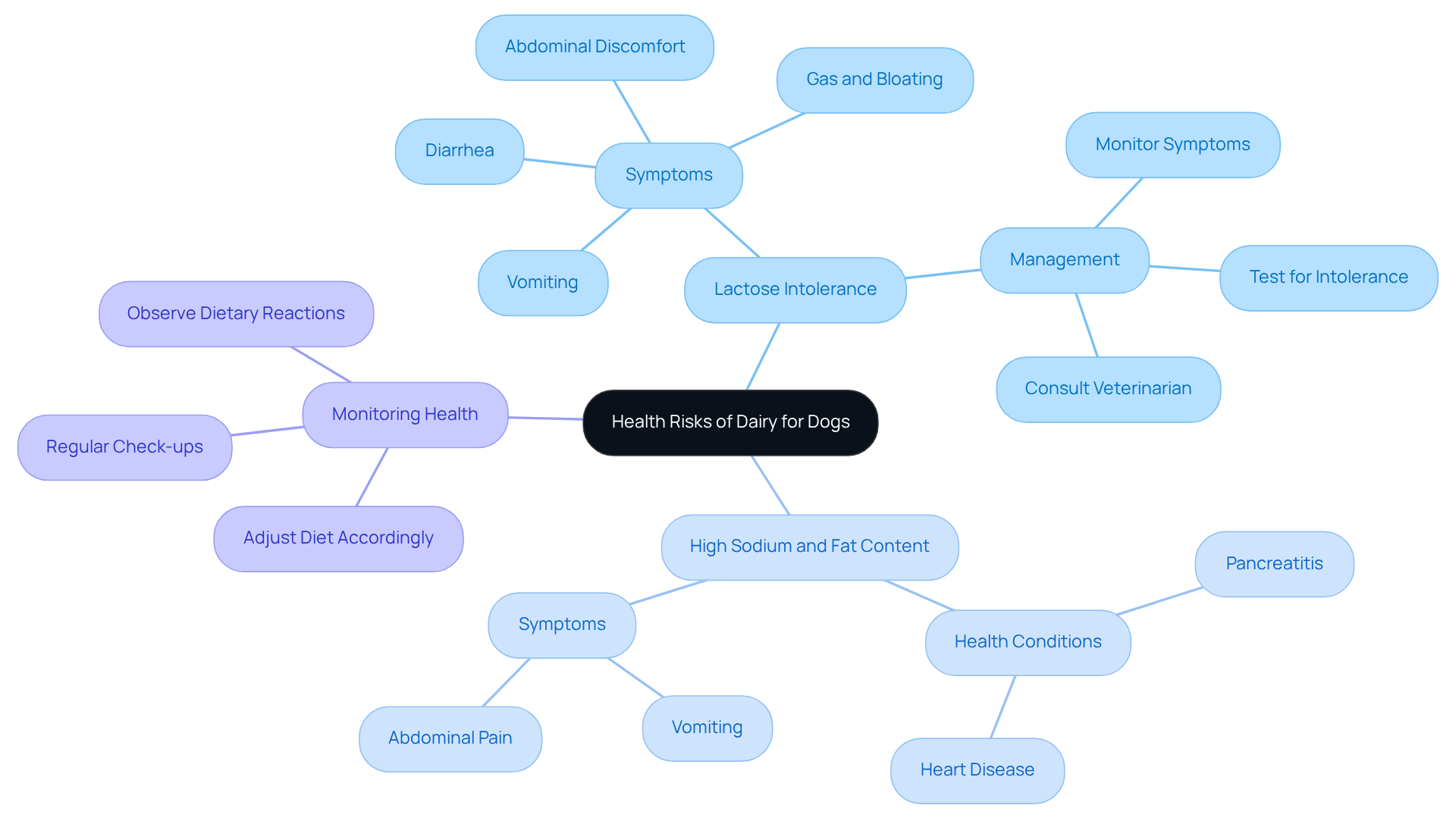
Evaluate Nutritional Impact: Benefits vs. Risks of Cheese
Cheese can be a wonderful addition to your furry family member’s diet, providing essential nutrients such as protein and calcium that support strong bones and muscle health. For instance, hard varieties like cheddar offer approximately 200 mg of calcium per ounce, while cottage curds deliver about 65 mg in a half-cup. These nutrients play a crucial role in maintaining skeletal integrity and overall vitality in dogs. However, moderation is key; while dairy can serve as an effective training treat or a clever way to disguise medication, it is important to consider if cheese is bad for dogs, as excessive consumption may lead to obesity and digestive disturbances. When incorporating dairy into their meals, it’s important to consider if cheese is bad for dogs, along with their overall dietary needs and health status.
Nutritionists emphasize that the AAFCO guidelines recommend adult dogs receive at least 1.25 mg of calcium per kcal, translating to 1.25 grams for every 1,000 kcal. This guideline is essential for understanding how dairy products can fit into your dog’s overall diet. Furthermore, inadequate calcium consumption can lead to severe medical issues, including inflammation of the pancreas and kidney failure. While safe dairy options for dogs include mozzarella, cottage cheese, goat cheese, and plain low-fat dairy, which are lower in fat and lactose, it’s important to ask, is cheese bad for dogs?
Consulting with a veterinary nutritionist, like Tiffany Tupler, can provide tailored guidance on how to safely incorporate dairy into your dog’s diet without jeopardizing their well-being. Remember, while dairy can offer nutritional benefits, balancing its inclusion with your dog’s overall dietary needs is crucial to avoid potential health risks. Your pet’s health and happiness are worth the extra care!
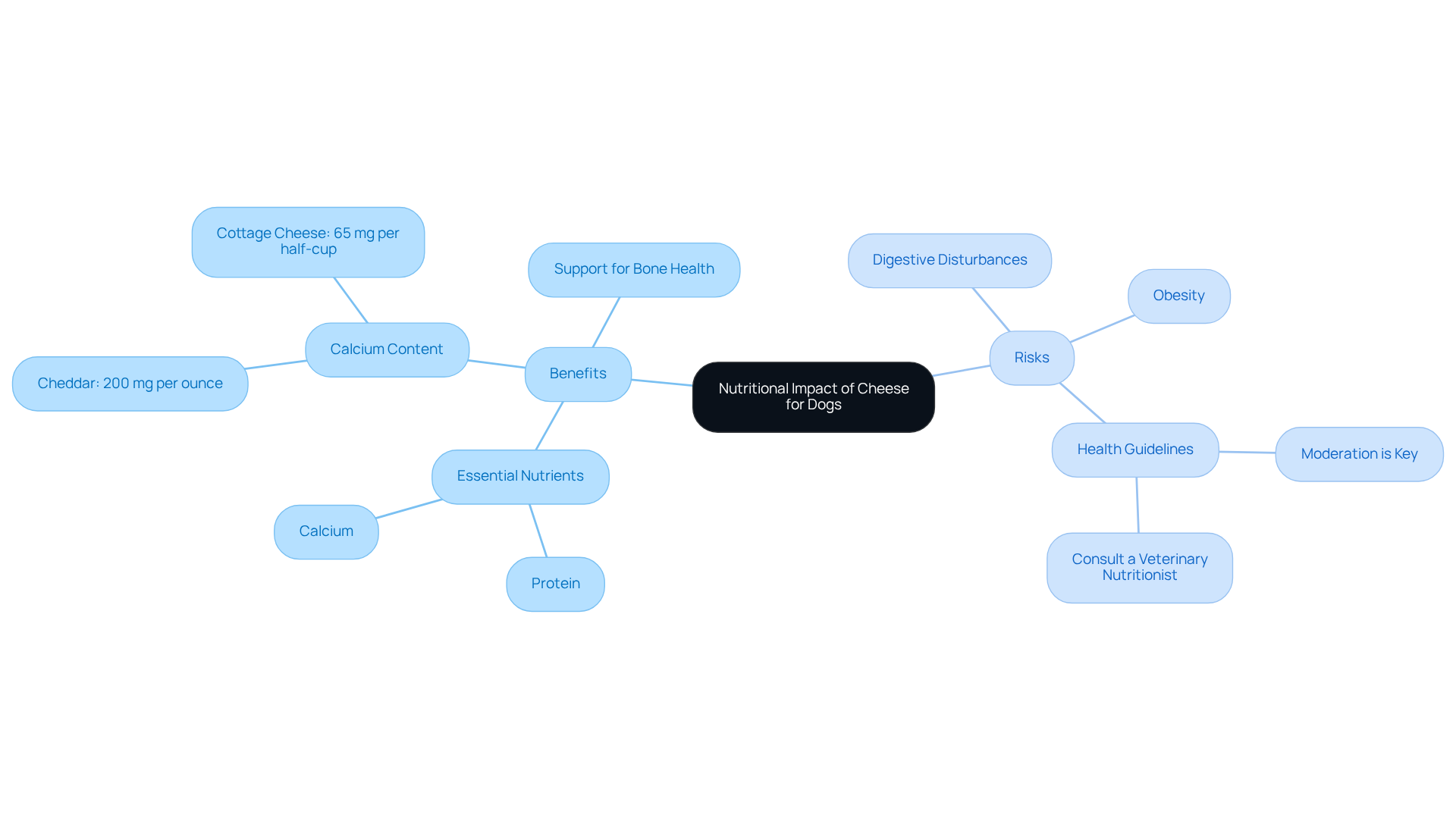
Implement Safe Feeding Practices: Guidelines for Cheese Consumption
As a loving pet owner, you may wonder if cheese is bad for dogs while considering how to safely include dairy products in your dog’s diet. It’s important to follow specific guidelines to ensure your furry family members enjoy these treats while staying healthy. Opt for low-lactose options like cheddar, mozzarella, or cottage cheese, which are generally safer for dogs. Just one serving of dairy can provide a third of their daily phosphorus needs, making it a nutritious addition when given in moderation.
When introducing dairy products, do so gradually and monitor your dog for any adverse reactions. This is particularly vital for breeds like schnauzers and cocker spaniels, which may be more sensitive to dietary changes and at greater risk for issues like pancreatitis. Remember, moderation is key; limit dairy to small amounts, ideally no more than 10% of your dog’s daily caloric intake, to help prevent weight gain and digestive issues.
Additionally, it’s crucial to avoid dairy products that contain harmful additives such as garlic, herbs, or preservatives, as these can be toxic and lead to gastrointestinal distress. To ensure the safety of your beloved pet, consulting a veterinarian before adding dairy to their diet is always a wise choice. By following these nurturing practices, you can allow your dog to relish cheese as a delightful treat, while also considering if cheese is bad for dogs to minimize potential health risks.
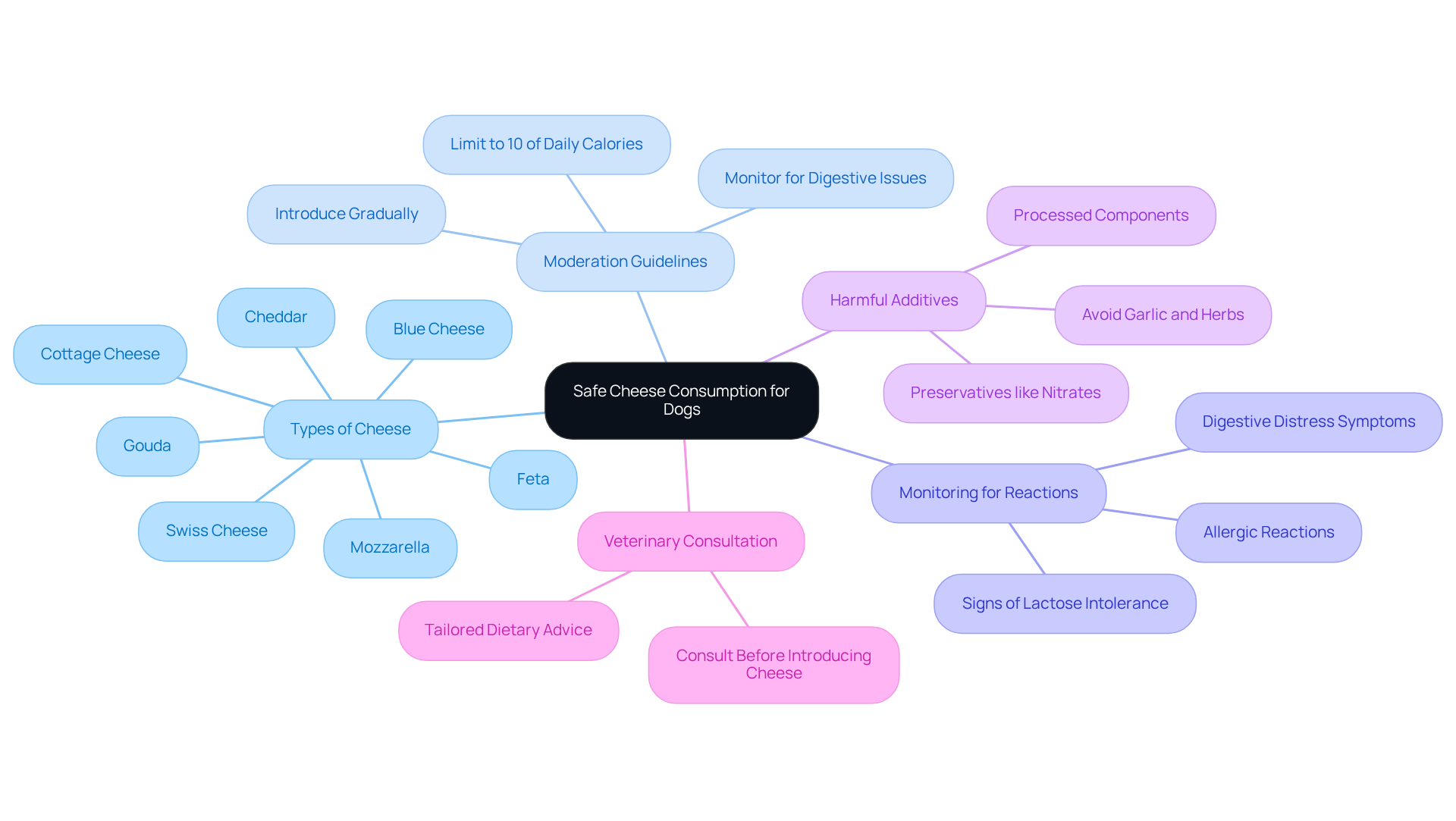
Conclusion
Cheese can be a delightful treat for your furry family members, yet determining its safety requires thoughtful consideration. While many dogs can enjoy cheese in moderation, factors such as individual health conditions, lactose tolerance, and the specific type of cheese are crucial in assessing its suitability. Understanding these nuances is essential for ensuring cheese remains a special addition to your dog’s diet, rather than a potential health risk.
Throughout this discussion, key points have emerged regarding the risks and benefits associated with cheese consumption in dogs. It’s important to recognize that while cheese provides beneficial nutrients like protein and calcium, excessive intake can lead to digestive issues, obesity, and other health complications. Signs of lactose intolerance, such as vomiting or diarrhea, should prompt immediate reevaluation of cheese in your dog’s diet. Opting for low-fat and low-sodium cheese varieties can help minimize risks while still allowing your pet to enjoy this tasty treat.
Ultimately, the safety of cheese for dogs hinges on informed choices and moderation. We encourage pet owners to consult with veterinarians before introducing cheese into their dog’s diet, ensuring it complements their overall nutritional needs without compromising their health. By prioritizing your dog’s well-being and making educated decisions about their dietary treats, cheese can remain a joyful and safe reward for your beloved companion.
Frequently Asked Questions
Is cheese safe for dogs to eat?
Cheese can be a safe treat for many dogs when given in moderation, but individual health conditions and nutritional requirements must be considered.
What factors affect whether cheese is bad for dogs?
Factors include the type of dairy product, the dog’s size, existing health issues, and the dog’s ability to digest lactose.
Can all dogs digest cheese?
Up to 90% of adult dogs may lack the enzymes needed to digest lactose, which can lead to digestive discomfort if they consume too much cheese.
Are there specific types of cheese that dogs should avoid?
Yes, certain cheeses, especially blue varieties that contain roquefortine, should be strictly avoided due to potential toxicity.
What types of cheese are recommended for dogs?
Low-fat and low-sodium options such as mozzarella and cottage cheese are recommended for dogs.
How much of a dog’s diet should consist of dairy products like cheese?
Dairy should only make up a small portion of a dog’s diet, ideally no more than 10% of their daily caloric intake.
What are the signs of lactose intolerance in dogs?
Signs of lactose intolerance can include vomiting, diarrhea, bloating, and gas.
Should cheese be a regular part of a dog’s diet?
No, cheese should not serve as a primary source of nutrition for dogs and should be treated as an occasional treat.

